
Seminar, National Quiz and Conferences
Transdisciplinary Research in Life Sciences: Planetary Health (ICTRLS-2025)
Date: 06 March 2025
2nd International Conference on Transdisciplinary Research in Life Sciences: Planetary Health (ICTRLS-2025) organized by Department of Life Sciences, Kristu Jayanti College Autonomous, Bengaluru in collaboration with The University of Transdisciplinary Health Sciences and Technology (TDU), University of Michigan - Flint USA and Belmont University, USA on 6th March and 7th March 2025 witnessed insightful discussions on ecological sustainability and interdisciplinary learning. The inaugural ceremony was graced by Chief Guest Prof. Chandrabhas Narayana, Director, Rajiv Gandhi Centre for Biotechnology, Thiruvananthapuram. Fr. Jais V Thomas, in his Presidential Address, emphasized the shift from anthropocentrism to biocentrism, highlighting interdependence and the need to integrate technology with philosophy for ecological harmony. Prof. Chandrabhas Narayana delivered inaugural message by emphasizing that “just knowing biology is not enough” and advocating for learning beyond exams. He introduced concepts like "Bio-E3 (Economy, Environment and Entrepreneurship)" and "Bio Clusters", emphasizing their incorporation into such conferences to foster meaningful learning. The event also featured the release of the Book of Abstracts and Book on Medicinal Plants of Smart Medicinal Garden of the college maintained by Department of Life Sciences. The ceremony kickstarted a strong beginning for discussions on planetary health, sustainability, and the role of biotechnology in addressing global challenges. The conference witnessed 100 paper and poster presentations and above 170 participants from more than 30 institutions. The conference was well appreciated for structured sessions and being well organized by all the participants.
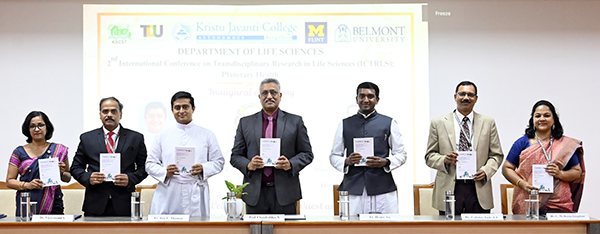
Seminar on Innovation to Incubation
Date: 18 October 2024
The Biopreneurship Club at Kristu Jayanti College, in collaboration with the Kristu Jayanti Incubation Centre, successfully organized a seminar titled "Innovation to Incubation" on October 18, 2024. This seminar was tailored for III Semester MSc Microbiology students, focusing on guiding them through the process of transforming innovative ideas into viable businesses within the life sciences field.
The seminar was conducted by Dr. Muruganantham A, the esteemed Director of the Kristu Jayanti Incubation Centre. Dr. Muruganantham’s vast experience in incubation strategies and business development offered students an in-depth perspective on how to harness innovation for entrepreneurial success. Through this session, students gained insights into the incubation processes, the support systems available to budding biopreneurs, and how to turn scientific innovations into commercially viable enterprises.
This event exemplifies the Biopreneurship Club's commitment to nurturing entrepreneurship among life sciences students by providing them with the tools and knowledge necessary to explore business opportunities in biotechnology, microbiology, and related fields.
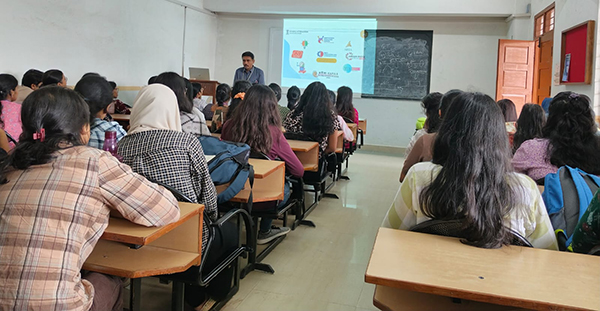
International Conference on Transdisciplinary Research in Life Sciences: Perspectives and Prospects 2024
Date: 22 & 23 February 2024
The Department of Life Sciences, Kristu Jayanti College Autonomous, in collaboration with The University of Trans-Disciplinary Health Sciences and Technology (TDU), Bengaluru, organized a two-day International Conference on Trans disciplinary Research in Life Sciences (ICTRLS-2024) on February 22 & 23, 2024. The two day conference, aimed at exploring new perspectives and prospects in the field of life sciences through transdisciplinary research. The chief guest for the occasion was Padma Shri Prof. Darshan Shankar, Vice Chancellor of TDU and Managing Trustee, FRLHT, Bengaluru. He was recognized for his outstanding contributions to the field with prestigious awards including the National Award in Medicinal Plants (2006) and the Padma Shri (2009). Dr S. Natesh, Honorary Fellow at ATREE and former Senior Advisor (Scientist –H), Department of Biotechnology, Government of India, was the guest of honour. He received accolades for his significant role in shaping biotechnological research in India, including the DBT Special Achievement Award (2017) and the Karnataka Rajyotsava Award (2020). The event commenced with a warm welcome address by Dr Calistus Jude, Dean, Faculty of Sciences, Kristu Jayanti College Autonomous, who highlighted the significance of the conference as a transformative force in the field of life sciences. Fr. Dr Augustine George CMI, Principal, Kristu Jayanti College Autonomous, who delivered the presidential address and expressed his delight in hosting such a significant event. He emphasized the importance of collaborative research in addressing complex global challenges, particularly in areas like agriculture and healthcare. During the inaugural speech, Padmashree Prof. Darshan Shankar, Vice Chancellor, TDU and Managing Trustee, FRLHT, Bengaluru, underscored the intricate interconnections of life and the need for transdisciplinary approaches in research. He emphasized the role of Ayurveda in complementing modern medicine and highlighted India's leadership in this domain. Dr S. Natesh, Honorary Fellow at ATREE and former Senior Advisor at the Department of Biotechnology, Government of India, the Guest of Honor, congratulated the college on its silver jubilee and encouraged strategic planning for the future. He emphasized the importance of collaboration in education and research, stating that it is the key to success in the present-day world. A book of abstracts with papers received from students and researchers of various national and international institutions around the country and the world was released on the occasion. The two day international conference with more than 200 delegates will witness seven plenary sessions spanning diverse domains and more than 100 oral presentations and poster presentations.
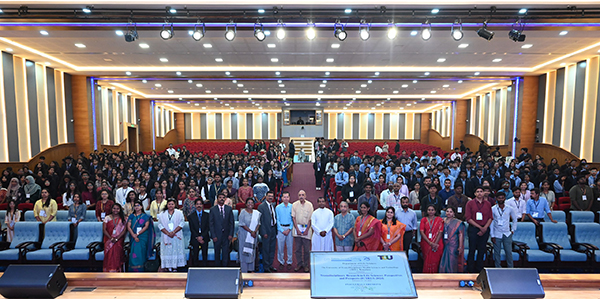
Research Empowerment Seminar
Date: 03 April 2023
The Department of Life Sciences in association with the Library and Information Centre of Kristu Jayanti College organized Research Empowerment Seminar for the First Year PG Microbiology students on 3rd April 2023. The goals of this seminar program were to enhance the intellectual atmosphere of the department, to provide students with opportunities to develop skills in publicly presenting research results, and to facilitate faculty monitoring of student research progress. The program was organized to encourage the students to present their research in public to a general audience. A high rate of participation in such a visible research-oriented activity could help build the intellectual "atmosphere" of the department. Increased knowledge of one another’s research would facilitate intergroup interactions.
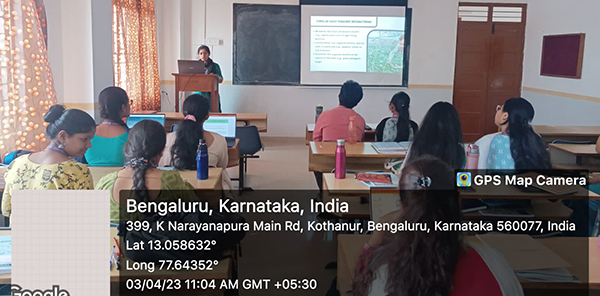
National Quiz Competition in Commemoration of Bicentennial Birth Anniversary of Gregor Johann Mendel
Date: 23 March 2023
To commemorate the Birth anniversary of Gregor Johann Mendel a National level Quiz was conducted for the undergraduate students of other colleges all over the country on 23.03.2023, organized by the Department of Life Sciences A preliminary round was conducted on the same by 9.00 am and out of 27 teams 8 teams entered into the finals. The winners and participants of the finals were felicitated by Rev.Fr Deepu Joy, Students Welfare Officer, Kristu Jayanti College with Certificates and a Cash prize.
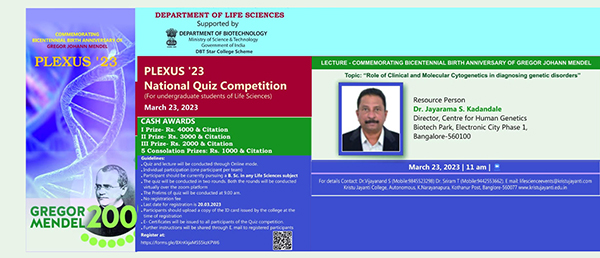
International Conference On Plant - Microbe Synergy: Unravelling Strategies for Natural Resource Management
Date: 24 & 25 January 2023
The Department of Life Sciences, Kristu Jayanti College, organised a two-day international conference for the year 2023, “Plant-Microbe Synergy: Unravelling Strategies for Natural Resource Management”. The Conference provided a leading interdisciplinary platform for scientists, researchers, industry experts, and academicians across the globe to interact and share their knowledge and ideas. The conference began with the inaugural session. Fr. Jais V Thomas, delivered the Presidential address and through his inspiring words, he emphasized the role of science in solving food and other issues to add quality to mankind. Our esteemed chief guest, Dr. R.P Tewari, Former Director, ICAR- Directorate of Mushroom Research, Solan; and Director, Saptarishi Agro Industries Pvt. Ltd., Ahmedabad, during his inaugural address, shared his practical work of utilizing agro waste in providing food for mankind. Dr. N B Prakash, in his address, shared the role of rich soil in natural resource management in plant-microbe interaction for improving food production. As a part of the conference six plenary sessions were organized with eminent resource persons and about 20 research scholars participated in technical paper presentations.
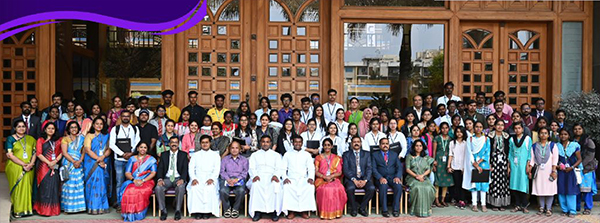
International Virtual Conference on 'Evolving Paradigms in Biotechnology: Combating Contemporary Challenges
Date: 1st and 2nd April 2022
The world is going through a phase of turbulence due to the covid-19 pandemic. Biotechnology is perhaps the most important tool that humanity relied on, to fight the pandemic. An early understanding of the biology of the virus, development of diagnostics, and eventually of prophylactics and therapeutics were possible due to Biotechnology-based interventions. This has once again reinforced the potential of Biotechnology in offering solutions to seemingly intractable contemporary challenges.
It is in this context that the Department of Life Sciences, Kristu Jayanti College (Autonomous), and Jawaharlal Nehru Tropical Botanic Garden and Research Institute (KSCSTE-JNTBGRI) organised the two-day International Virtual Conference on 'Evolving Paradigms in Biotechnology: Combating Contemporary Challenges' on 1st and 2nd April 2022. The conference brought together scientists, academicians, research scholars, and graduates in the field of Life Sciences and witnessed in-depth deliberations on the emerging trends, and latest innovations in Biotechnology that helps tackle contemporary issues in the domains of healthcare, medicine, agriculture, food, environmental sustainability, and remediation, amongst others. The conference featured 5 plenary sessions handled by internationally renowned scientists and three parallel paper presentation sessions. The conference, due to the uniqueness in the scientific themes it focuses on has been well received by the scientific community. ICEPB’22 received 50 research papers for presentation from across the country. The conference was inaugurated by the renowned neurobiologist Dr. K. P Mohanakumar, Director, Inter University Centre for Biomedical Research & Super Speciality Hospital, Mahatma Gandhi University, Kerala. He also delivered the keynote address on the topic ‘What Biotechnology Drives & What Drives Biotechnology’. Fr. Dr. Augustine George, Principal, Kristu Jayanti College presided over the inaugural ceremony. While delivering the presidential address he congratulated the organisers for choosing a unique topic with contemporary relevance as the focal theme of the conference. Dr. KB Ramesh Kumar, Principal Scientist, Phytochemistry & Phytopharmacology Division, KSCSTE- JNTBGRI delivered the felicitation address.
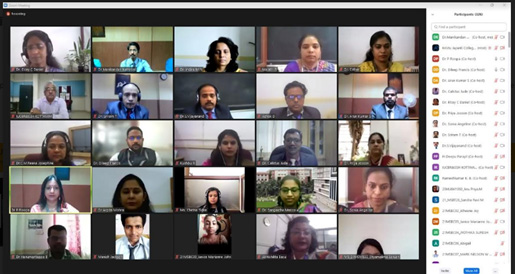
International Virtual Conference on Sustainable Biotechnology
The Department of Life Sciences, Kristu Jayanti College (Autonomous), Bangalore conducted an International Virtual Conference on Sustainable Biotechnology during 18th and 19th of March 2021.
This conference explored the avenues of sustainable development through Biotechnology. The two day programme included six technical sessions delivered by international experts and three panels for research paper presentations mainly focused on Green Energy, Biotechnology & Health, Sustainable Crop Production, Environmental monitoring, Biofertilizers & Biopesticides, Environmental Biotechnology and Drug Discovery. Also the conference had witnessed participation of academicians and scholars from different universities across the globe.
Sustainable development has become indispensable in the current world, as it constitutes a strong support factor for the process of facing crises and the need for conserving the available natural resources from being over-exploited. The transformations that happened during the last few decades due to significant evolution of research in biotechnology has now reached a stage of explaining living processes in molecular level.
Prof.M.Krishnan, Honourable Vice Chancellor of Madurai Kamaraj University, Tamil Nadu, during his inaugural address insisted on practical approach in the field of Biotechnology and the application of microbial products to bring about sustainability in health and agriculture. Rev. Dr. Augustine George, Principal, Kristu Jayanti College (Autonomous) Bangalore, stated that the focus should be on finding new strategies towards the use of natural resources and to maintain a sustainable ecosystem through biotechnological approach.
During the conference, the technical sessions were on the topics “Bacterial Honeycomb” by Dr.Thamarai Kannan, University of Bedforshire, UK, “Microalgae based biorefineries” by Dr.Nidia Caeteno, University of Porto, Portugal, “Pathogenesis mechanism and Emerging Therapeutic options for Covid 19” by Dr.Saravanan, Mekelle University, Ethiopia, “Physics-Based and AI-Based Computational Strategies for Drug Discovery: in silico Screening and Multi-parametric Compound Optimization” by Dr.Anil Nair, Icagen Ligand Company, US, “Microbial Conversion of greenhouse gases into value added Products” by Dr. Lisa Stein, University of Alberta, Canada, “Sustainable manufacturing of Biosurfactants Challenges and possibilities of Research and Industry” was delivered by Dr. Rahman, Tara Biologicals, UK.
The deliberations made during this conference provided major insights to promote sustainability in the society and environment through Biotechnology.
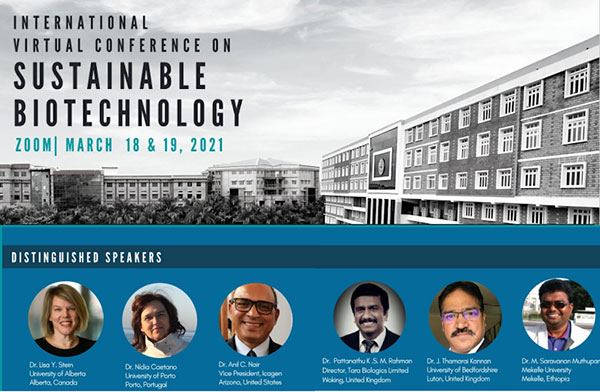
National Conference on Inclusive Development Through Biotechnology
Earth is our common home where survival and development are possible. But the environmental resources are limited and have certain technological discoveries, but human needs are always growing. The earth cannot be made bigger and richer to supply our growing needs. On the other hand, our development activities should be enabled to continue in the long term and our future generations must get what we have got. So we must use the resource wisely, carefully and responsibly to let our coming generation live the comfort we lived, that is we should aim towards sustainable development. Sustainable development has become a priority for the world’s policy makers. Among the broad range of technologies with the potential to reach the goal of sustainability, the field of Biotechnology takes an important place.
In this contextual, the Department of Life Sciences, KristuJayanti College organized a two day National Conference on “Inclusive Development through Biotechnology” on 17th and 18th January 2020.
The two day conference sheltered topics ranging from conservation of biodiversity, bioremediation, nutraceuticals, biofuels, entrepreneurship and progress in health sector.
The inaugural ceremony of the conference was presided by Fr. Josekutty P.D, Principal, KJC and the guest of honour was Dr. T. V. Ramachandra, Co-ordinator, Energy & Wetlands Research Group, CES, Indian Institute of Science. In his presidential address, father enlightened about the importance of Biotechnology in conservation of resources. Dr. T. V. Ramachandra spoke on the need to save mother Nature- Earth in the inaugural speech. Proceedings of the conference were released in the form of abstract book. The guests honored the winners of 7th National Level Green India EssayCompetition and felicitated Green campus Technical Staff Mr. Binu.
After inaugural function, the conference had Scientific Session I by Dr. T. V. Ramachandra, Co-ordinator, Energy & Wetlands Research Group, CES, Indian Institute of Science. The session was on “Optimal Treatment of Domestic Waste Water throughconstructing Wetlands and Bioremediation. The lecture gave insights on diversity in species in and around Western Ghats and their benefits to Mother Earth and hediscussed on Topography in Bangalore from past few decades.
Post lunch, in the Scientific Session II, Dr. ArvindSaklani, Vice President, Sami Labs Private Limited spoke on nutrceuticals as food supplements, their statistics, developing process and enlightened on medicinal herbal plants and its benefits.
The resource person for the scientific session III was Dr. P. E. Rajasekharan, Principal Scientist, Division of Plant Genetic Resources, ICAR-IIHR. Sir briefed about biotechnological interventions for the conservation of biodiversity. He emphasized on the fact for long-term conservation, cryopreservation (-196°C) is presently the only technique available.
Day 1 of the conference ended with oral and poster presentation sessions. The second day of the conferencebegan with yet another session of oral presentation and moved on to the scientific session IV. The speaker for the session was Mr. BhimasenVadavi,Head Projects,Sartorius Private Limited. His lecture was on Upstream processing technology in Microbial & Mammalian Culture. Sir discussed on the use of mammalian and microbial cells in the production of biologics and vaccines and what are the parameters need for the design of a bioreactor.
Dr. Harinikumar K. M, Professor and Co-ordinator,Department of Plant Biotechnology, University of Agricultural Sciences, GKVK Campus in the scientific session V spoke on Advances in Biofuel technology – A scope for Entrepreneurship in Agriculture. Sir elaborated on the “present-day” photosynthetic conversion of solar energy to chemical energy, which sets them apart from fossil fuels that are based on ancient photosynthesis. He conveyed that the line between renewable biofuels and non-renewable fossil fuels is sometimes vague and only complete life-cycle analyses in the future will reveal which feed stocks are truly renewable to be used in biofuel production.
RNA is a fascinating biomolecule. We know that the messenger RNA can be translated in the cytoplasm. However not all the mRNAs get translated all the time in the cytoplasm. Some mRNAs are stored in the cytoplasm and some are degraded. Aberrant changes in the functional status of mRNA can lead to disease conditions such as Cancer and Neuro-degenerative disorders was the basis of the talk in the scientific session VI delivered by Dr. Purusharth I. Rajyaguru, Assistant Professor, Department of Biochemistry, Indian Institute of Science, Bengaluru.
In conclusion, the two day conference had 6 scientific sessions, 3 oral presentation sessions and 1 poster presentation session. Delegates for the conference were from colleges in and around Bengaluruand the total number accounted to 44. Full length paper articles are published in UGC CARE online journal: International Journal of Life Science and Pharma research (ISSN: 2250:0840).
Thus the two day conference “INCLUSIVE DEVELOPMENT THROUGH BIOTECHNOLOGY” was an enriched one and knowledge rewarding experience.

The National conference on Biochemistry-Transcending and integrating Life Sciences (NCBTIL) was organized by the Department of Life Sciences, Kristu Jayanti College, Bangalore on 17th and 18th January 2019.The two-day conference was inaugurated by Dr. S. Ravichandra Reddy, Former Acting Director, NAAC on 17th January. The presidential address was delivered by Fr. Josekutty P D, Principal of Kristu Jayanti College where he emphasized the need to transcend and integrate, research and academia among different Life Science streams through Biochemistry. The prelude to the conference was presented by Prof. Priya Josson, co-convener of the conference and vote of thanks was delivered by the convener of the conference, Dr.Vijayanand. There were 80 participants representing 20 different colleges from 4 different states. 26 research papers were published in The International Journal of Pharmacy and Biological Sciences, UGC indexed journal. There were 40 oral and poster presentations pertaining to the theme of the conference. The conference enabled the participants to receive intelligent insights from some of the leading academicians and professionals form reputed Universities, institutes and industries to be abreast with the latest advances in Biochemistry and Biological Sciences.
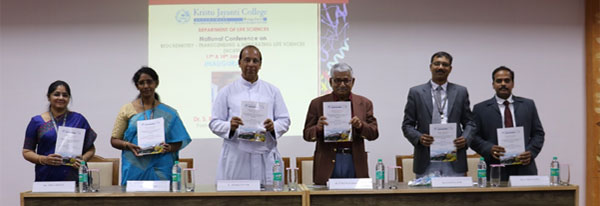
Sl. No. |
Date |
Full Title |
Name of the Resource Person(s) with designation |
Type of Event* |
No of |
|
Internal |
External |
|||||
1 |
22-23/1/2018 |
National Conference on Genetics for Human Welfare |
Dr. Mittur Jagadish |
Inter |
105 |
66 |
2 |
01/03/2018 |
National Seminar on Microfluidics |
Dr. Jonathan Pillai, |
Inter |
222 |
|
3 |
06/12/2017-07/12/2017 |
Faculty Development Programme on Data Analysis on Natural sciences |
Mr.Seby Kallarakkal |
Inter |
33 |
17 |
S.No |
Date |
Title |
Resource person(s) with designation |
No of participants |
1 |
20/03/2017 |
FDP Data Analysis in Natural sciences, |
Dr.K.P.Suresh, Scientist, NIVEDI, Bangalore |
25 |
2 |
25/01/2017 |
National Seminar on Biofilm Technology |
Dr. AnandKhedkar Dr. S. MURUGAN
Dr. B. ANANDKUMAR
Dr.KUSHI ANAND
Dr. C.NAGARAJ
Dr.KAVITHA G. |
53 |
3 |
09/03/2016 |
National Seminar on Tropical infectious diseases(NASTID) |
Dr.UV Babu, Head, Department of Phytochemistry, |
30+140(UG &PG) |
4 |
19/12/2016 |
FDP-Workshop on BioInstrumentation |
Dr.E.M.Elango, Director, ResearchSerene Cell Sciences & Technologies, Bangalore
Mr.S.Srinivasan Mr.K.E.Shankar, Director, Serene Cell Sciences & Technologies, Bangalore Mr.Somashekar,Scigenics Biotech Ltd, Bangalore Mr.Nagaraju |
17 |
| Title | Resource Personnel |
|---|---|
| National Seminar on Modern Biology Perspective and Prospects (2009) | Dr.Rathore, Inst.Wood Science & Technology Dr.T K S Gowda, GKVK, Bangalore Dr. S K Srinivas, Analysis Sciences Mr.S P Venkatesh Prasad, Aarom Pharmaceuticals Ind.Ltd. Dr.Uday Kumar Ranga, JNCASR Dr.Maya Paul, KOP Ms.Vidya Virajith, GSK |
| National Seminar on "Evolvingtrends in Bioprocess Engineering" (2010) | Dr. Divakar, Dy. CFTRI Dr. Keshav Nireshwalia, CFTRI Mr. Ganesh Ramu, United Breweries Dr. U V Babu, Himalaya Healthcare Dr. Subhasis, Millipore India Pvt. Ltd. Dr. Gurpreet Kalsi, ITC Ltd Dr. Baladev, CFTRI Mr. Nitesh Dave, Biocon, Bangalore |
| National Conference on Plant Diversity: prospects and problems of conservation (2010) supported by Dept. of IT, BT and S & T, Govt. of Karnataka | Mr. K. Arul Thomas , Robust Mushrooms, Tamil Nadu Mr. Sushant Sekhar, Jayaa Agro Foods, Bangalore Dr. Paneerselvam , IIHR, Bangalore Dr. Devaraj Achar, Indo American Hybrid Seeds, Bangalore Mr. Sanjay Bettadpura, Polyclone Bioservices, Bangalore |
| National Workshop on Entrepreneurship for Post Graduate Life Science Students (2011) in association with NEN | Mr. K. Arul Thomas , Robust Mushrooms, Tamil Nadu Mr. Sushant Sekhar, Jayaa Agro Foods, B angalore Dr. Paneerselvam , IIHR, Bangalore Dr. Devaraj Achar, Indo American Hybrid Seeds, Bangalore Mr. Sanjay Bettadpura, Polyclone Bioservices, Bangalore |
| Science Academies Lectureworkshop on "Frontiers in Biology" (2013) in association with National Science Academies | Prof. Kumar Somasundaram Prof. K.N. Balaji Prof. Dipshika Chakravorty Prof. Nagasuma Chandra Prof. Annapoorni Rangarajan Prof. Utpal Nath Indian Institute of Science, Bangalore |
| National Seminar on Science and Technology for Human Development (2015) - in association with ISCA, Bangalore Chapter | Prof. Govindan Rangarajan, IISc, Bangalore Prof. N.B. Ramachandra, University of Mysore Dr. Abraham Varghese, NBAII, Bangalore Prof. Harrold Phillip, SK University, AP, Prof. M. G. Venkatesha, Bangalore University |

